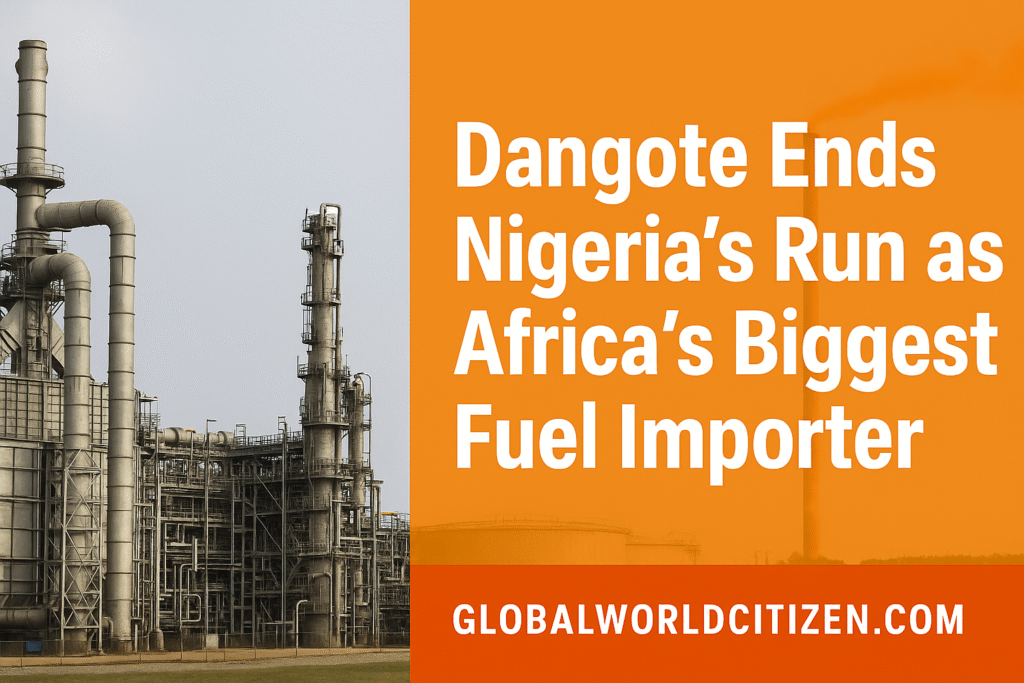Published: May 28, 2025 ✍️ Author: Global World Citizen Energy Desk 🌐 Source: GlobalWorldCitizen.com 📍 Category: African Energy, Global Oil Trade & Economic Development
In a historic energy milestone, Nigeria has officially relinquished its long-standing position as Africa’s biggest fuel importer, thanks to the rise of Aliko Dangote’s massive 650,000-barrel-per-day oil refinery, now ramping up production in Lagos.
The new title holder? South Africa, where a shrinking domestic refining industry has triggered surging fuel imports and opened the door for global energy traders like Glencore and Vitol to capitalize on demand.
 Nigeria’s Fuel Imports Drop as Dangote Refinery Powers Ahead
Nigeria’s Fuel Imports Drop as Dangote Refinery Powers Ahead
The completion of the $20 billion Dangote refinery marks a major turning point in Nigeria’s oil and gas sector, long criticized for exporting raw crude while relying on expensive refined fuel imports.
“Nigerian imports are dropping as a result of the continued operation of Dangote,” said Elitsa Georgieva, executive director at energy consultancy CITAC.
According to CITAC data:
Nigeria imported 3.1 million tons of refined products in Q1 2025
South Africa imported 4.2 million tons during the same period
Forecasts show Nigeria will import 6.4 million tons in 2025, compared to South Africa’s 15.5 million tons
 The Bigger Picture: African Nations Push for Energy Independence
The Bigger Picture: African Nations Push for Energy Independence
This shift underscores a broader continental movement toward energy sovereignty. From Uganda to Mozambique, governments are now investing in local refining infrastructure to reduce dependence on international imports.
But the journey is not without hurdles:
Dangote’s refinery faced delays and cost overruns, ultimately exceeding its original $12B budget
South Africa has seen about 49% of its refining capacity shut down due to accidents, underinvestment, and policy stagnation
“The dream of African energy independence is alive, but it’s a marathon—not a sprint,” says GlobalWorldCitizen.com energy analyst Nina Eboh.
 South Africa Becomes Africa’s Fuel Magnet
South Africa Becomes Africa’s Fuel Magnet
With over 60% of its fuel demand met by imports, South Africa is now a prime target for international fuel traders.
Recent developments:
State-owned Transnet SOC Ltd. confirmed the nation’s refining output has been halved since 2020
The government acquired the closed Sapref refinery from Shell and BP in a bid to reignite local production
Gunvor and other Swiss traders are eyeing strategic fuel retail acquisitions, signaling renewed investor interest
 GlobalWorldCitizen.com Insight
GlobalWorldCitizen.com Insight
The emergence of the Dangote Refinery is not just a Nigerian story—it’s a pan-African economic reset. As Nigeria scales back its fuel imports, other African nations must confront the fragility of their energy ecosystems and double down on local capacity, infrastructure, and policy reforms.
The future of Africa’s energy landscape lies in regional self-sufficiency, global partnerships, and bold investments like Dangote’s.

